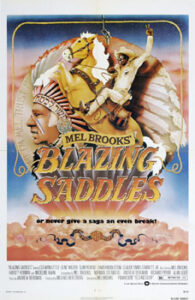 Back when Black Lives Mattered, (HBO) Max briefly pulled ‘Gone with the Wind’ from its video library as an indirect response to protests about racism. The movie was later returned with a disclaimer to provide context. This struck a reasonable balance between the aesthetic importance of the work and the moral importance of presenting slavery honestly. The disclaimer also provided context for the film, such as how racism impacted the black actors. Perhaps because of the success of this approach, Max also added a disclaimer to the classic comedy ‘Blazing Saddles’.
Back when Black Lives Mattered, (HBO) Max briefly pulled ‘Gone with the Wind’ from its video library as an indirect response to protests about racism. The movie was later returned with a disclaimer to provide context. This struck a reasonable balance between the aesthetic importance of the work and the moral importance of presenting slavery honestly. The disclaimer also provided context for the film, such as how racism impacted the black actors. Perhaps because of the success of this approach, Max also added a disclaimer to the classic comedy ‘Blazing Saddles’.
This classic comedy-western engages with racism and prominently features racist characters using racist language. But, as the disclaimer noted, it is anti-racist. The racists are the villains. Racism is savagely mocked. As such, it might be wondered why the film required a disclaimer. This seems like putting a disclaimer before ‘All Quiet on the Western Front’ to make it clear that the famously anti-war film is not pro-war.
One concern about putting a disclaimer on a film like ‘Blazing Saddles’ is it could provide ammunition to those saying the “politically correct cancel culture of the left” is out of control. It could be used as “proof” that “the left” is wrong about criticisms of racism in aesthetic works. In reply, the right can create outrage ex nihilo and thus a disclaimer will have no meaningful impact aside from providing a focus of the outrage. That said, the disclaimer might have some impact on those critical enough to check to see if the target of the outrage exists, yet not critical enough to be thorough critics of the outrage.
This might seem a silly concern, but things like a movie disclaimer can strike “normies” as ridiculous and this can be exploited as part of the radicalization process. The strategy is that an “absurd” response from “the left” can help build a gradual ramp leading into the pit of, for example, racism.
Another concern is the disclaimer might be seen as insulting. It seems to suggest viewers are too stupid to understand the obvious point of the movie, that racism is bad. As a counter, people do misread comedy. A good example of this is the character of Stephen Colbert once played by Stephen Colbert on the Colbert Report. While Colbert is a liberal who mocks conservatives (and liberals) some conservative viewers believed that he was serious about being a conservative. They understood he was doing comedy (the show was on Comedy Central) but did not get his point. While it is anecdotal evidence, I know conservatives who thought this. Since we all enjoyed the show, I was careful not to spoil their fun with the truth. As such, it is possible that the movie might be seen by some people as endorsing racism
As another example, the 1975 “Germans” episode of “Fawlty Towers” includes the use of the N-word by the character of the major. In the episode, the major corrects someone for using a racist slur by suggesting they use another racist slur. In 2013 the BBC edited the episode to take out the word, which created a negative reaction in some quarters. A few years ago the BBC pulled the episode from streaming.
John Cleese, who played the main character on the show said that the racism of the major was presented in a negative light and that the point of the line was to criticize (with comedy) rather than commit racism. According to Cleese, “You see, what people don’t understand, there’s two ways of criticizing people. One is a direct criticism. And the other is to present their views as they would present them, but to make sure that everyone realizes that the person presenting those rules is a fool. And literal-minded people, who are the curse of the planet, can’t understand that. They think if you say something, you must mean it literally.” The decision makers seem to have come to agree with Cleese. The episode was eventually restored, but some streaming services included a disclaimer or warning.
While these are only two examples, they do show how people can be mistaken about the intent of comedy. As the “Fawlty Towers” example shows, people can be confused about the intent of the use of racism in comedy. As such, the use of disclaimers even for comedies critical of racism would seem justified. The explanation provided can help people understand the intention of the work and realize that the racism in the comedy is not intended to be racist but is critical of racism. As such, the use of disclaimers could be a reasonable means of preventing such confusion. This benefit must be balanced against the possible harm, though. It can be argued that a reaction from “the left” about a work they mistake as racist would provide even better fodder for the right-wing outrage engines than the disclaimer. If the argument is a good one, then this would serve to justify the use of disclaimers.
As a final point, it is certainly sensible to inform potential viewers about content that they might find problematic, but it might suffice to add a text warning at the start (“contains comedy critical of racism that references racism”) rather than a disclaimer.
